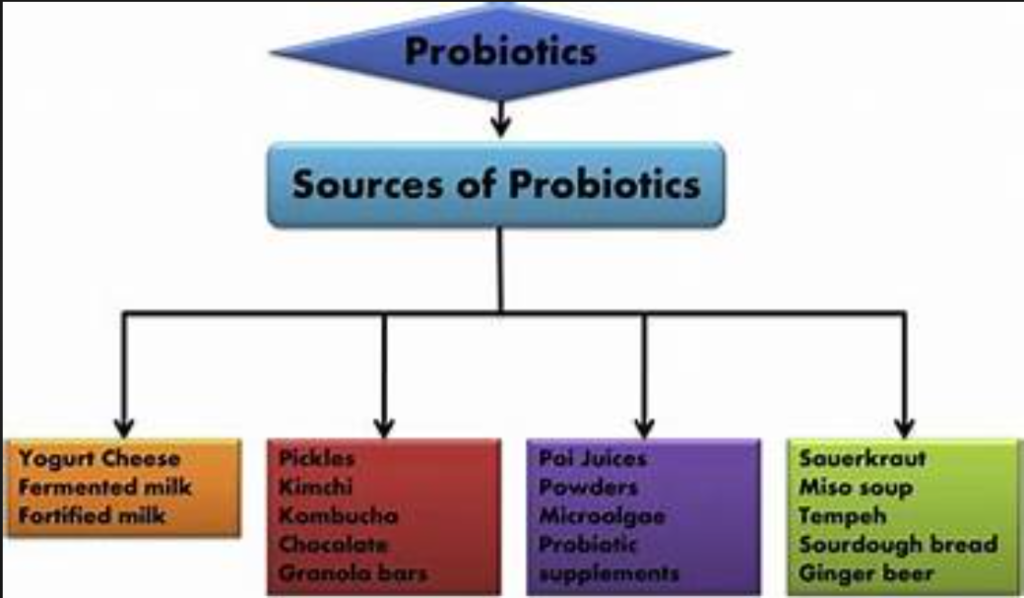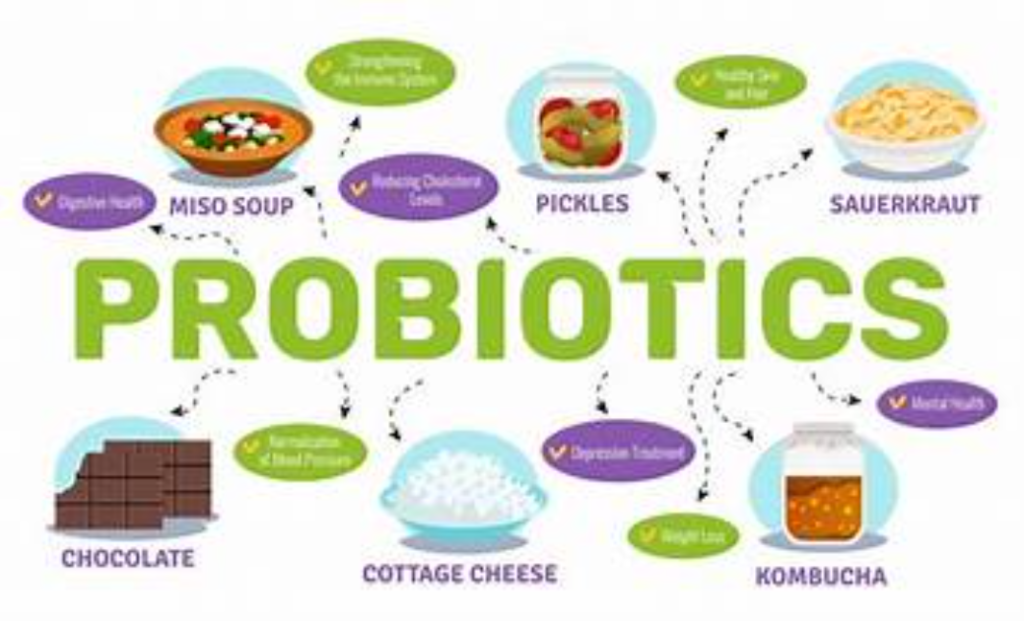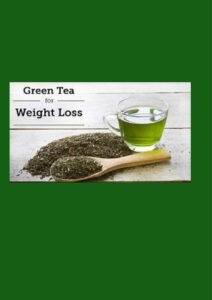What do probiotics do?: is often referred to as “good bacteria,” probiotics are live microorganisms that provide health benefits to the host when ingested in sufficient quantities. These good spirits reside mostly in our stomachs, where they perform a plethora of tasks that go well beyond simple digestion.
What Do Probiotics Contain when ingested in sufficient quantities, live microorganisms are beneficial to health. Lactobacillus, Bifidobacterium, and other common strains are present in fermented foods such as yogurt, kefir, sauerkraut, and supplements.
Functions of Probiotics:
• It improve the uptake of nutrients.
• It relieve gastrointestinal complaints such as gas, gas and bowel obstructions.
- It provide Immune System Support : by consolidating the defense mechanisms of the body.
•It Lower the chance of diseases and infections.
Digestive Health: it helps in Improving Nutrition Absorption: Probiotics help break down complex food ingredients, which facilitates the absorption of vital nutrients. They help the body absorb the most nutrients possible from the foods we eat by aiding in the digestion of dietary fibers, proteins, and fats.
It has been demonstrated that probiotics can reduce common digestive discomforts like bloating, gas and bowel obstructions. They foster a balanced population of bacteria in the gut, which facilitates the best possible digestion conditions.

Immuno-system Assistance:
Developing Stronger Defense Mechanisms Probiotics serve as the first line of defense for the immune system, which has its headquarters in the gut. They strengthen the body’s defenses against infections and illnesses by promoting the generation of antibodies and immune cells. Probiotics have been shown to strengthen the immune system by lowering susceptibility to common illnesses when taken regularly.
Minimizing the Risk of Infections: In the gut, probiotics compete with harmful pathogens for binding sites and resources. By doing this, they lessen the chance of infections by preventing the colonization of dangerous bacteria. A crucial component of the protective function of probiotics is this competitive exclusion. within the body.
Investigating the Gut-Brain Link: New scientific findings have shed light on the complex connection between the gut and the brain, which is commonly known as the “gut-brain axis.” Probiotics support this link by affecting the synthesis of neurotransmitters like serotonin, which is essential for mood regulation. Probiotic consumption may benefit mental health, possibly assisting in the treatment of anxiety, depression, and stress.
Handling Stress and Anxiety: Research has examined the ability of some probiotic strains, especially those from the Lactobacillus and Bifidobacterium genera, to reduce stress and anxiety. The evidence that is currently available indicates that consuming probiotics may help to maintain a healthy gut microbiome, which may improve mental health, though more research is required.
Weight Management: The Connection Between Weight and Gut Health Scientific interest in the relationship between gut health and weight control is growing. Probiotics may have an impact on energy balance and metabolism, which may help with weight regulation. Probiotics can help achieve and maintain a healthy weight when combined with a balanced diet and exercise routine. However, they are not a stand-alone weight loss solution.
Supporting Weight Loss: Research indicates that some probiotic strains may help people who are trying to lose weight. Probiotics may have an effect on variables that affect body weight, including inflammation, fat storage, and appetite control. Probiotics must, however, be seen as a component of a comprehensive weight-management strategy.
Typical Foods High in Probiotics are:

1 Yogurt
2 Kefir
3. Kimchi and Sauerkraut
4 Fermented Pickles
5. Miso: Umami Elixir: Traditionally made from rice, barley, or soybeans, miso is a staple food in Japan. Rich in umami flavor, miso improves gut health by supplying healthy bacteria, like Bifidobacterium and Lactobacillus, to soups, marinades, and dressings.
For Variety of Cooking: Try incorporating miso not only into traditional miso soup, but also into glazes, stir-fries, and salad dressings for a distinctive take. The only thing that comes close to matching the richness of flavor it adds to food is its ability to increase the variety of microbes in your stomach.
6. Tempeh: Probiotics Driven by Plants: Fermented soy products like tempeh are full of probiotics, especially Bacillus subtilis, and have a strong nutritional profile. For those looking for plant-based alternatives, tempeh offers a highly protein-rich option as a flexible meat substitute.
Innovative Uses in Cooking: For a satisfying texture, add tempeh to sandwiches, stir-fries, or grilling. Tempeh’s gut-loving qualities can be further enhanced by marinating it in sauces high in probiotics, which will also create a savory flavor that is good for your microbiome and your taste buds.
7 Natto: A Futuristic Fermentation: The Japanese food dish made from fermented soybeans has a unique scent and a slimy texture that make it an acquired taste. However, it is a nutritional powerhouse for gut health due to its probiotic content, which includes the strain Bacillus subtilis.

Real Pleasure: Savor natto in its classic form over rice or as a special garnish for sushi rolls. Foodies who are bold in their tastes may enjoy the nuanced flavor profile of natto, but those who prefer softer flavors may try adding it to sauces or as a garnish for savory foods.
8. Buttermilk: Customs in Cooking: Butter churning byproduct buttermilk has long been a mainstay in many different cuisines across the globe. It has historically been high in Lactobacillus bacteria, which gives it a tart taste and probiotic advantages.
Applications for Refreshment: Enjoy a glass of buttermilk for a cool, probiotic-rich drink. It also adds flavor and moisture to pancakes, muffins, and biscuits while baking, making it a culinary asset.
9. Pickled Vegetables: Adding Diverse Fermentation Elements: To vary your probiotic intake, try a variety of pickled vegetables in addition to the traditional kimchi and sauerkraut. Some examples of vegetables with a variety of flavors and textures are pickled carrots, beets, and radishes.
Serving Ideas: Use pickled veggies as a zesty side dish or incorporate them into wraps and salads. A delightful addition to your culinary repertoire, pickled vegetables offer a delightful combination of crunch and probiotic goodness.
In conclusion, probiotics have benefits that go well beyond digestive health. These tiny allies have a significant impact on our general health, strengthening the immune system, affecting mental health, and possibly even helping with weight management. As we delve deeper into the vast universe that is inside our bodies, it is becoming more and more evident that taking probiotics to nurture our gut is essential to achieving and preserving a state of holistic well-being.





